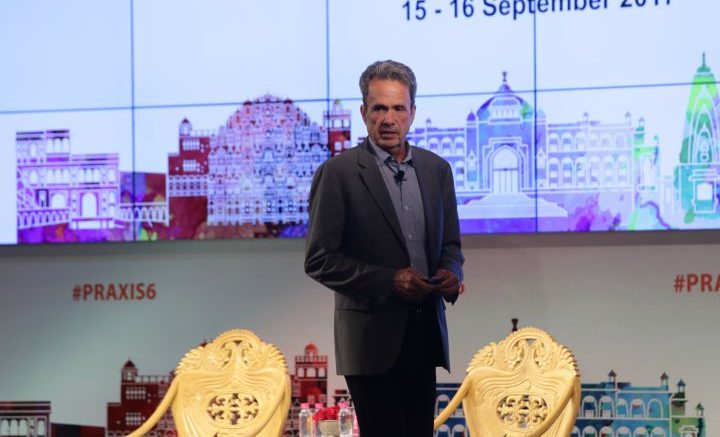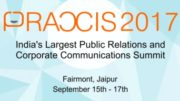While starting off his keynote address on Being Relevance Obsessed and Relevance Equipped Communicators, Fred Cook, Chairman, Golin observed that he was here to talk about the concept of Relevance and how it applies to what we do. A lot of people use Relevance as a buzzword, or it’s buried as one of a million metrics in a brand health study next to things like awareness and commitment and likeability. And no one is “anti-relevance”, he pointed out. It’s nothing more important than an individual or a brand being relevant, and there’s nothing worse than being irrelevant in our business! He added – “But for us, it’s our entire firm’s strategic point of view. That’s why we’re excited to talk to you about what relevance means to us, how and why we study it, and the research we did this year to help us get smarter”.
Some brands have become irrelevant like Nokia. And some brands like James Bond, Amazon, Apple have been around for a long time and have become more relevant.
It is a two-part principle. Relevance is what attracts and keeps people paying attention to what brands have to say. It is – the willingness to listen and willingness to act. It’s about listening, and people need to listen. And, the act – like sharing stories with friends, voting for you in the elections, buying your brands etc.
The Science of Brand Research, a recent global study undertaken by GOLIN and USCAnnenberg looked at two parts: Relevance Landscape – Awareness and Enthusiasm and Relevance Finger print – Dimensions of Relevance.
What they learnt from the Global Relevance Study was very pertinent. Each category had its own learnings. They knew Relevance isn’t a black and white concept. Relevance changes over time. It’s multi-dimensional, region specific, category specific, and audience specific, but there was one clear pattern that held true across all categories. In the “battle for relevance in 2017, truth is having a moment of truth”.
In every country and category, people think brands should deliver on trust. But the most relevant brands are cutting through the clutter without it. However, while people are seeking it, leading brands aren’t relevant for being ethical, moral, honest, and truthful (Trustworthy). In fact, none of the most relevant brands they tested meet the ideal when it comes to being trustworthy! They are under-delivering on that dimension or driver of relevance. But these brands are seen as relevant.
There are unique dimensions that drive each category, but there is one that helps drive all relevance leaders: Being Popular (being talked about or recommended by others.). This is a pretty big deal, and signals a massive shift. It’s not the brands shouldn’t be truthful. Of course they should. They need to prove it every day. But being talked about by others will go a long way in making a brand relevant. This means our inner circles are more important than ever, he pointed out and that “advocates and influencers are at a premium”.
If people can’t count on brands, then they will count on other people – their trusted tribes. Right now, what they say is more important what brands are telling us themselves. This is why he insisted – “Talkability Trumps Truth”.
If you want to be relevant, other people are going to have to advocate for you, and there are probably a number of different ways. You just have to be willing to listen, and focus on the key relevance drivers. They aren’t always the ones you think.
In the Social Media landscape – people want trust. Take the brand Facebook – it was not as trusted as people want it to be, though 50% of news people get through Facebook. India is different from the rest of the world. Every category, geography is different. Elements changed from one landscape to another. Facebook and YouTube are important in India. Indian consumers expect more from brands in India than anywhere else in the world.
In the banking world, transparency is most important. In the banking sector, SBI is leading, with ICICI second, followed by Citibank, HSBC, Standard Chartered. SBI ranked high on trust. Indian consumers are more trusting of brands. Brands are evolving at different paces in different parts of the world. “We are more skeptical of brands than India! The PR people are doing a wonderful job that brands are better loved in India!” he observed.
How do you get past ‘fake’ news, asked Aakriti Bhargava, Boring Brands. We can be relevant in a good way or bad way. Being proactive works for many brands, but not everyone. We did a survey regarding fake news and asked people in the next five years, if they can distinguish what is real and is not – and people could not make out, he disclosed. As PR people we have to behave better and get better professionals into the business – was his insight.
What is the future of the profession? Always try to be trusted. In India it happens, but in different parts of the world, it’s a challenge.
When asked about his thoughts on innovation, he referred to McDonald’s ‘all day breakfasting’ campaign, which he felt was innovative. He described how they encashed on it. What they did was to go to Twitter and send individual messages to everyone who asked about having breakfast all day! That’s how we told the story on social media, did it work?
Finally, came the important tip: as PR people we have to be bold, more aggressive, have more courage and we are going to be fine! We are dynamic people and need to redefine the term!










Be the first to comment on "Being relevance-obsessed and relevance-equipped communicators"